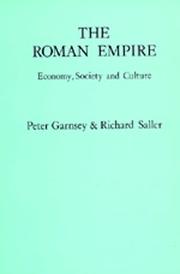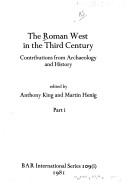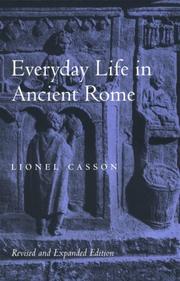| Listing 1 - 10 of 51 | << page >> |
Sort by
|

ISBN: 0520060660 0520060679 9780520060661 Year: 1987 Publisher: Berkeley: University of California press,
Abstract | Keywords | Export | Availability | Bookmark
 Loading...
Loading...Choose an application
- Reference Manager
- EndNote
- RefWorks (Direct export to RefWorks)
Rome --- History --- Histoire --- -Rome --- Rome - History - Empire, 30 B.C.-284 A.D.
Book
ISBN: 9780748623037 9780748623044 0748623043 0748623035 0748629920 1281785709 9786611785703 Year: 2008 Volume: *3 Publisher: Edinburgh : Edinburgh University Press,
Abstract | Keywords | Export | Availability | Bookmark
 Loading...
Loading...Choose an application
- Reference Manager
- EndNote
- RefWorks (Direct export to RefWorks)
This was a time of civil war, anarchy, intrigue, and assassination. Between 193 and 284 the Roman Empire knew more than twenty-five emperors, and an equal number of usurpers. All of them had some measure of success, several of them often ruling different parts of the Empire at the same time. Rome's traditional political institutions slid into vacuity and armies became the Empire's most powerful institutions, proclaiming their own imperial champions and deposing those they held to be incompetent. Yet despite widespread contemporary dismay at such weak government this period was also one in which
Rome --- History --- Roman history --- Histoire --- Rome - History - Empire, 30 B.C.-284 A.D.
Book
ISBN: 9788834334119 8834334116 Year: 2017 Volume: 15 Publisher: Milano: Vita e pensiero,
Abstract | Keywords | Export | Availability | Bookmark
 Loading...
Loading...Choose an application
- Reference Manager
- EndNote
- RefWorks (Direct export to RefWorks)
La "Storia dell'Impero dopo Marco" di Erodiano è l'unica opera storiografica relativa agli eventi del III secolo d.C. che ci è giunta integralmente ma non ha ancora ricevuto adeguate attenzioni, poiché il suo autore è stato ritenuto in passato uno storico di scarso valore. Erodiano appare invece uno storico dotato di una spiccata autonomia di giudizio che offre chiavi interpretative originali sulla storia che va dalla morte di Marco Aruelio (180 d.C.) all'avvento di Gordiano III (238 d.C.) e coglie molto bene i sintomi di una crisi già in atto, che appare ai suoi occhi senza sbocchi e senza rimedio.
Hérodien --- Herodian --- History --- Rome --- Herodian - History --- Rome - History - Empire, 30 B.C.-284 A.D. --- Hérodien

ISBN: 0860541274 9780860541271 Year: 1981 Volume: 109 Publisher: Oxford: BAR,
Abstract | Keywords | Export | Availability | Bookmark
 Loading...
Loading...Choose an application
- Reference Manager
- EndNote
- RefWorks (Direct export to RefWorks)
Romans --- Rome --- England --- History --- Antiquities --- Antiquities, Roman --- #BIBC:bibl.Reekmans --- Romans - England --- Rome - History - Empire, 30 B.C.-284 A.D. --- Rome - Antiquities --- England - Antiquities, Roman

ISBN: 0801859913 0801859921 9780801859922 9780801859915 Year: 1998 Publisher: Baltimore: Johns Hopkins University press,
Abstract | Keywords | Export | Availability | Bookmark
 Loading...
Loading...Choose an application
- Reference Manager
- EndNote
- RefWorks (Direct export to RefWorks)
Rome --- Social life and customs --- History --- Social life and customs. --- Rome - Social life and customs --- Rome - History - Empire, 30 B.C.-284 A.D.
Book
Year: 1847 Publisher: Berlin : Veit,
Abstract | Keywords | Export | Availability | Bookmark
 Loading...
Loading...Choose an application
- Reference Manager
- EndNote
- RefWorks (Direct export to RefWorks)
Book
ISBN: 9781725271869 1725271869 Year: 2023 Publisher: Eugene, Oregon Cascade
Abstract | Keywords | Export | Availability | Bookmark
 Loading...
Loading...Choose an application
- Reference Manager
- EndNote
- RefWorks (Direct export to RefWorks)
The world's ever growing highly partisan political environment has fuelled a renewed interest in the study of politics in the New Testament. This interest has given rise to "empire criticism," which attempts to understand how the Roman Empire affected the early Christian communities and writings. The subgenre of "Paul and empire" studies has produced several important studies, but none have offered a clear methodological approach to this topic. This book fills this lacuna by introducing readers to the difficulties of method in Paul and empire studies, as well as introducing them to contemporary methods, debates, and other issues. Most importantly, it will be a guide for learning to apply sound methods to this field of study.
Book
ISBN: 9780521766418 0521766419 Year: 2011 Publisher: Cambridge: Cambridge university press,
Abstract | Keywords | Export | Availability | Bookmark
 Loading...
Loading...Choose an application
- Reference Manager
- EndNote
- RefWorks (Direct export to RefWorks)
The present study proposes to examine the political ideology of the early Sasanian empire. In doing so, it shall not only look at Sasanian and Roman relations, but also at Arsacid precedents, for possible stimuli in the formation of the Sasanian ideology. Already Roman historians of the third and fourth centuries CE perceived the imperialism of the Sasanians as infused with the desire to equal, even to surpass, the glory of the kings of old by recovering formerly Achaemenid territories-by then part of the Roman East. In contrast, contemporaneous Sasanian royal inscriptions, in particular the res gestae of Sabuhr the Great and the inscription of king Narseh at Paikuli, neither provide us with a rationale for the war of conquest waged against Rome, nor do they contain any explicit references to the historical predecessors of the Sasanians. This conflicting finding raises questions about historiographical practices in Sasanian Iran and Rome. Indeed, one wonders how Sasanians recorded their past, or the extent to which they were acquainted with it; equally important an inquiry is the nature of Roman knowledge of Sasanian history, as well as the sources whence it had been extracted. Only the elucidation of these problems would allow us to address our initial query, that is, whether the early Sasanians experienced an "Achaemenid revival" that might have shaped their political ideology and prompted their expansionist campaigns against the Roman empire; or whether the revival ascribed to the Sasanians by Roman literati was in reality a Roman interpretation comprehensible only in light of Roman political exigencies Sasanian Persia, which succeeded the Parthians, was one of the great powers of late antiquity and the most significant power in the Near East together with the Roman Empire. This book undertakes a thorough investigation of the diverse range of written, numismatic and archaeological sources in order to reassess Sasanian political ideology and its sources and influences in the ideologies of the Achaemenid Persian Empire, Babylonian scholarship and prophesy, and Hellenistic Greek thought. It sheds fresh light on the political complexities of early Arsacid and Sasanian history, especially the situation in Babylon and Elymais, and on the Roman propaganda which penetrated, shaped and determined Roman attitudes towards Sasanian Persia
Sassanids. --- Sassanides --- Arsacid dynasty, --- Iran --- Rome --- History --- Histoire --- Sassanids --- Ancient --- General --- General. --- Arsacid dynasty, - 247 B.C.-224 A.D. --- Iran - History - To 640 --- Rome - History - Empire, 30 B.C.-284 A.D. --- Arsacides (dynastie) --- Sassanides (dynastie)
Book
ISBN: 9780199655342 0199655340 9780198795445 1306270677 0198795440 0191758302 0191627232 9780191758300 9780191627231 Year: 2016 Publisher: Oxford: Oxford university press,
Abstract | Keywords | Export | Availability | Bookmark
 Loading...
Loading...Choose an application
- Reference Manager
- EndNote
- RefWorks (Direct export to RefWorks)
This is the first fully comprehensive study of the auxilia, a non-citizen force which constituted more than half of Rome's celebrated armies. Diverse in origins, character, and culture they played an essential role in building the empire, sustaining the unequal peace celebrated as the pax Romana, and enacting the emperor's writ.
Rome --- Army. --- History, Military. --- Social conditions. --- History --- Armée --- Histoire militaire --- Conditions sociales --- Histoire --- Armée --- Army --- History, Military --- Social conditions --- Rome - Army --- Rome - History, Military --- Rome - Social conditions --- Rome - History - Empire, 30 B.C.-284 A.D.
Book
ISBN: 9782877062329 2877062325 Year: 1994 Publisher: Paris: Éd. de Fallois,
Abstract | Keywords | Export | Availability | Bookmark
 Loading...
Loading...Choose an application
- Reference Manager
- EndNote
- RefWorks (Direct export to RefWorks)
Emperors --- Empereurs --- Death --- Biography. --- Death. --- Biographies --- 30 B.C. - 284 A.D. --- Rome (Empire) --- Rome --- History --- Histoire --- Biography --- Emperors - Rome - Biography --- Rome - History - Empire, 30 B.C.-284 A.D.
| Listing 1 - 10 of 51 | << page >> |
Sort by
|

 Search
Search Feedback
Feedback About UniCat
About UniCat  Help
Help News
News